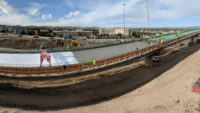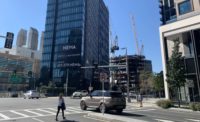Legal
Indianapolis Transit Agency Sues AECOM for Bus Hub Cost Overruns

Work on the Julia M. Carson Transit Center substantially completed in June 2016.
Photo courtesy IndyGo
Indianapolis transit agency IndyGo is suing AECOM USA Inc. and its subsidiary URS Corp. over a transit hub completed in 2016, alleging the engineers failed to account for building remnants and urban fill that were unsuitable for the project and ultimately caused months of delays and millions of dollars in cost overruns.
IndyGo, also known as Indianapolis Public Transportation Corp., hired URS in April 2013 as lead designer and architect of record for its Julia M. Carson Transit Center. AECOM later acquired the firm, completing the deal in October 2014. The scope of the engineer's work included civil and structural engineering, surveying and geotechnical services, cost estimating and other services associated with the project, according to IndyGo.
In its complaint, which was filed in Marion County, Ind., superior court Oct. 25, IndyGo says AECOM had historic maps showing structures on the site dating back more than 150 years, as well as boring logs that showed the presence of urban fill which would not be suitable soils for its selected spread footing design, but the firm did not account for the unsuitable conditions.
When excavation work began in November 2014, contractor Weddle Bros. Building Group LLC “almost immediately encountered unsuitable soils within the [planned building] footprint” including foundation and brick wall remnants, IndyGo says in its complaint.
“With Weddle’s work barely underway, the excavation operations on site were shut down, construction was already impacted both as to scope and time, and [IndyGo] was faced with a project site that was not constructable as designed and specified, was subjected to significant project delays, and was exposed to considerable remediation costs,” the transit agency states in the complaint.
Based on AECOM’s cost projections, the project budget included less than $7,000 for five days of archeological monitoring. Instead, the monitoring and remediation ended up lasting for months, with a team of 15 full-time archeologists working on site typically 10 to 12 hours per day, six days a week, plus others, costing about $11,500 per day, according to the complaint.
The project’s schedule also slipped, with scheduled substantial completion being pushed back from October 2015 to February 2016, and finally reached in June 2016. With it, IndyGo says it incurred $4.7 million in overruns. Local media reported the project’s final cost at $26.5 million.
It is not immediately clear why IndyGo waited until now to file the lawsuit. It has previously publicly congratulated AECOM and other firms involved with the design on awards the project won, and says it does not comment on pending litigation. AECOM also did not immediately respond to inquiries, and has not yet filed a response to the lawsuit.
IndyGo is seeking an amount of money to be determined from AECOM, accusing the firm of breach of contract, breach of express contractual warranties and breach of warranty of the adequacy of the plans and specifications.




